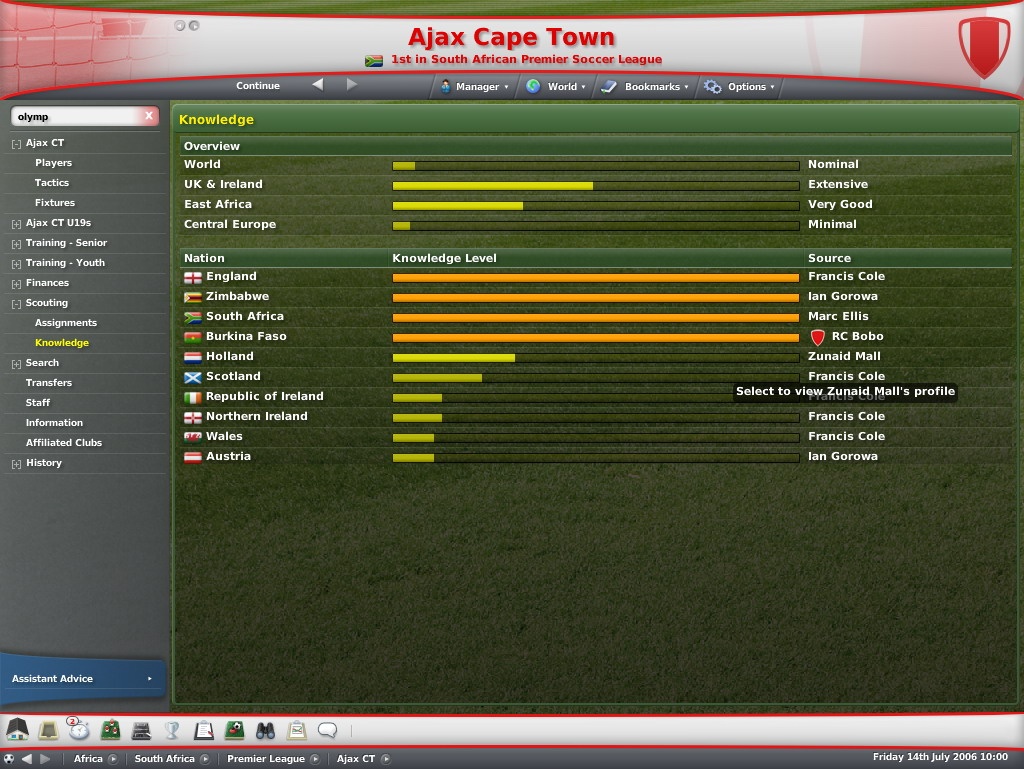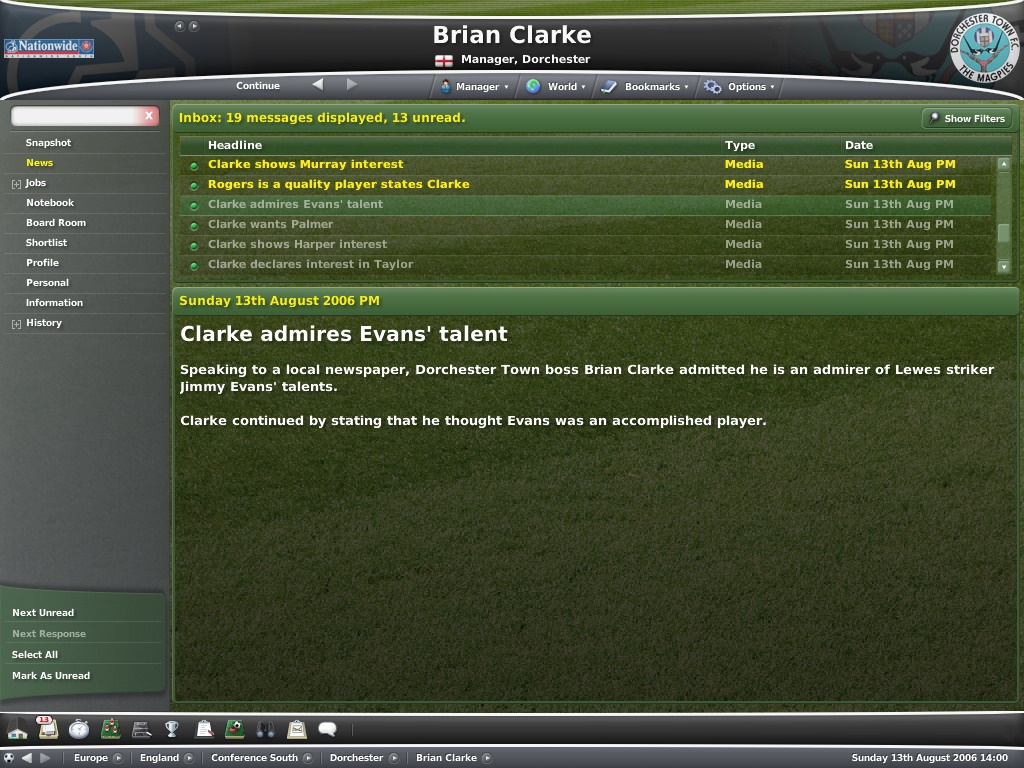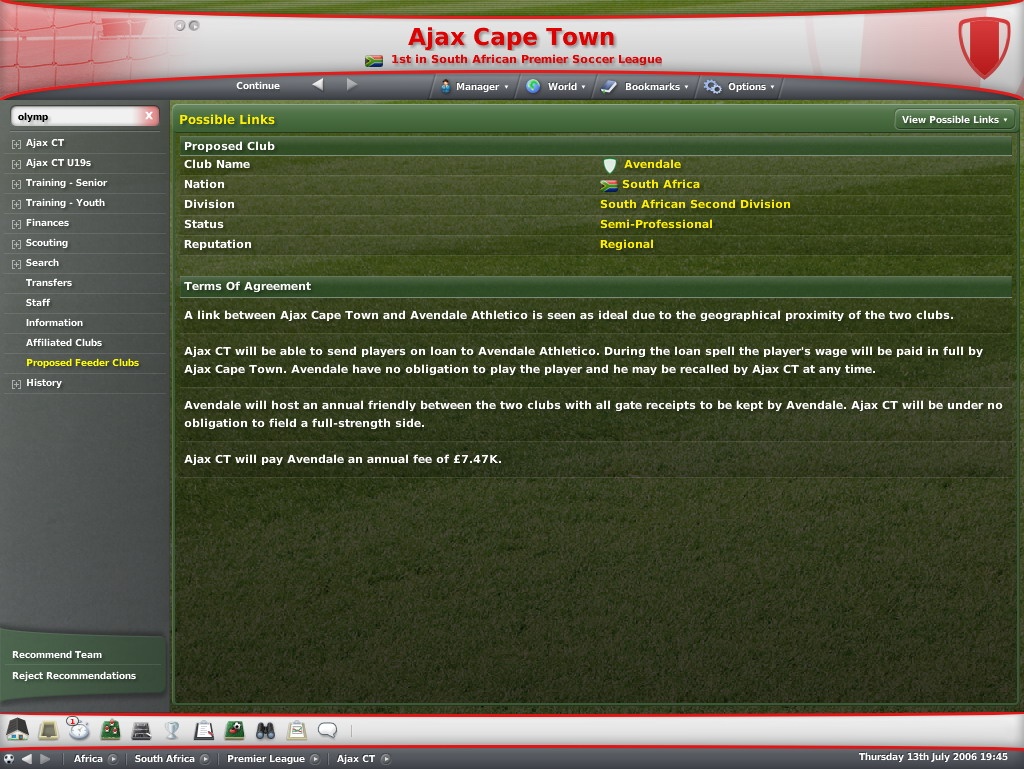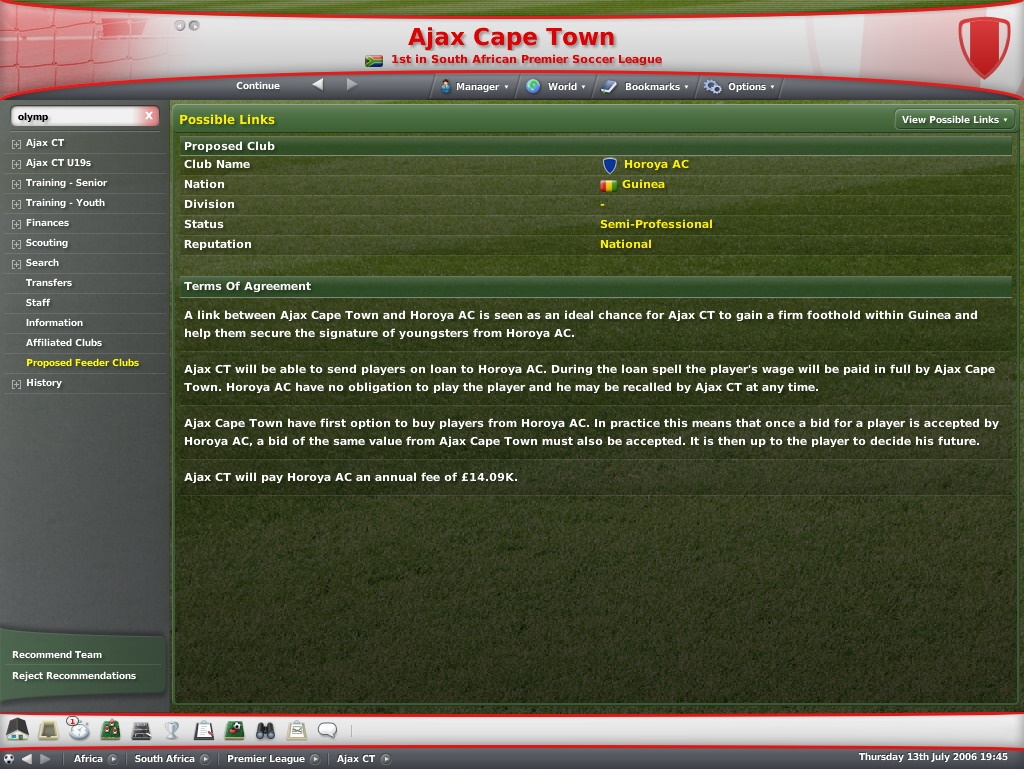Football Manager 2007 is Sports Interactive's third game since leaving the Championship Manager name behind, and while it's a case of evolution rather than revolution, it turns screens of statistics into something so absorbing that it is possible to lose entire hours, days, and weeks of your life analyzing.
The game, like most of its genre, thrusts you into the front line of football management at a club of your choosing. Where that may be is entirely up to you, and FM 2007 provides an almost endless list to choose from. You can go for the glamour of Barcelona or AC Milan, head to smaller clubs such as Accrington Stanley or Worksop, or take a punt with clubs from leagues you've almost certainly not heard of, such as the Hong Kong First Division. You can manage any of these clubs, and even international teams, should you so desire.

There are several options that you face when starting up a game, and those are based upon the number of leagues you want to activate. You can opt for four branches of setup: any nation, from a choice of more than 50, with the top two divisions active; any nation with the top four divisions active, where available; a combination of preset nations, grouped in twos or threes, with all divisions active; or a combination of preset nations grouped in fours and fives with a varying number of divisions active. The choices aren't as extensive as those on the PC--for example you can't simply make up any combination of nations or activate more than five at any point--but they do give you more than enough to be getting along with. The next step involves setting up your manager's profile, and because several of the divisions included in the game are fully licensed and contain player pictures, it's possible for you to add your own picture into the game, which is a nice touch.
After you're installed in your new job, you'll need to inspect your squad to work out where your team's strengths and weaknesses lie. That's something that may be much easier to do with big clubs, especially those with players you're familiar with, than it would be in lower league teams. So if you're a beginner, you might find it easier to start off with either a top team or one you know well.
You'll also start your management job with some idea of what the board and fans of your chosen club are hoping you'll achieve over the course of the season. Managers of football clubs live and die by results, so if the board is expecting promotion and you're delivering losses, you may find that your first contract ends prematurely. However, if that does happen, it's not the end of the game; you can apply for jobs with other clubs that have vacancies at any time, and you can even throw your hat into the ring anywhere if an incumbent manager's position is looking shaky.
It won't take long to learn your way around the game, although for anybody that's transferring from the PC, reeducating yourself on the location of various information screens might take a little longer. However, once you've played a few matches, it really does become second nature, and that's thanks largely to the well-used trigger buttons on the controller. At any time the left trigger button will bring up an overall menu that lets you continue, view your squad and its tactics, and so on, while the right trigger will show options more localised to the screen you're currently on. Pressing the start button will bring up the load and save menu, while other context-sensitive options can be found using the A, B, X, and Y shortcuts. It's all been configured in such a way that it doesn't take long for you to get to any screen you can think of.
Once you have a feel for your players, either through real-life knowledge or some careful inspection of players' relative statistics, you can begin to construct your title-winning team, choosing a formation and tactics that best fit the level at which you're playing. This can change from division to division, but while world-class players might prefer slick, fast passing manoeuvres and elegant counterattack plays, you'll probably be happy for your inexperienced, unfit, part-time lower league players to just lump the ball unceremoniously up the field at any opportunity--hit and hope.
As well as deciding whether to play 4-4-2, 4-3-3, or one of any number of other formations, you'll need to keep an eye on the financial state of the club, as this will give you an indication of what your transfer budget might be. Again, this reflects directly on the level at which your team competes, but unless your club is in debt, there's usually something in the kitty.

Having financial acumen is crucial, especially at smaller clubs, and you'll want to send out scouts to watch prospective transfer targets. FM 2007 introduces a new format to this section of the game, adding in knowledge bars for scouts based on their past experience. Some of them will specialise in certain countries or regions, and while smaller clubs might confine missions to a relatively local area, you'll want a good depth of global knowledge at your disposal if you want to compete on the world stage. Particularly important are staff members with South American experience, which may let you tap into the potentially priceless players of the Brazilian and Argentinean leagues and uncover the next Pele or Maradona before anybody else--and before the price gets too high.
Larger clubs will also have youth academies, which will give you an influx of youngsters each year, some of whom may make it through the youth and reserve teams and even break into your first-team squad over time. And another nice addition this year is the option to ask the board to consider setting up a formal arrangement with another club to send or receive players on loan. These agreements, known as feeder or parent clubs, can be very useful for big teams, letting them farm out promising youngsters for valuable first-team experience, and for small teams that would never normally be able to attract the young talent. It's something that has been around for a few years in real life, and it's great to be able to see the relationships transfer into the game.
The matches themselves are where the real action happens, and FM 2007's match engine has been refined further to create the most realistic player activity to date. The games are presented in a top-down view, with players as numbered circles moving around a pitch, which is usually green but can deteriorate into patchy brown to give you an idea of conditions on the ground. It's not the most sophisticated method of displaying a football match we've ever seen, and other games such as LMA Manager 2007 certainly pull it off with more aplomb, but the crucial aspect of it is that you can learn something from watching a match. The movement of players is almost bulletproof when compared to watching a real-life game, and it's incredibly easy to forget you are watching a bunch of circles move around inside a green rectangle.
By sacrificing visuals, FM 2007 does a far better job of providing a useful tool for analysis and entertainment than any of the fully 3D match engines. What's more, the rest of the game presents you with information in a clean and efficient manner, and it's clear that extensive work has gone into making the most important screens easily accessible. The trouble is that Football Manager 2007 doesn't give you a next-generation experience. Certainly the processing power is there to enable a fast, efficient approach to a generally quicker all-round game, but if you're used to something a little flashier, working your way through a series of screens won't be that appealing.
In addition, sound in the game is still fairly basic, with a dynamic crowd noise that rises and falls depending on what's happening in the game. But while the impact of sound in the game is minimal, there has been no real attempt to innovate in this area. Crowd noise cuts off suddenly at halftime and fulltime, and no attempt has been made to brighten the many menu screens with music or other sound effects.
That said, it's obvious where the focus lies in Football Manager 2007, and thankfully it's on the most important part of the game--the feeling of immersion. News items that alert you to goings-on from around the world are sensibly tailored to your own part of the world, while still keeping you in touch with important developments globally. Depending on your progress, journalists may approach you from time to time to ask you to comment on your situation. If you're on a winning streak, you might like to gloat a little or maybe praise the players. If you're not doing quite so well, you might prefer not to comment at all. Everything you say and do, especially where the media is concerned, can have an impact on the morale of your players, so it's important to consider the bigger picture when talking to the press.
Team talks return once again, letting you have some influence on the performance of the team on match day. While you can fire the players up or give them the hair-drier treatment, you're relatively powerless once the whistle goes. You can change basic tactics on the fly, as if shouting instructions from the touchline, but bigger changes and substitutions can take place only when there's a break in play.
Players, teams, league setups, and even competition rules are accurate for all of the 116 leagues across 51 countries that exist in the game, something which not only adds massively to the feeling of realism, but also gives you the scope to learn more about world football as you go.
Once your career is under way, the football world carries on around you, giving you as much attention, or as little, as your current managerial position deserves. From the moment you begin, FM 2007 creates an environment that's based on reality but lets you forge your own path and create your own stories. You have the scope to do almost anything within the confines of what a real-life manager would do, and setting yourself targets--or just seeing where "life" takes you--is one of the best parts of the game.
Sports Interactive has also set about making use of Xbox Live to facilitate multiplayer games, and on paper it's a pretty good idea. The options let 2, 4, 8, or 16 players hook up and play through a friendly league or cup, with either new or existing manager profiles. The matches are played out as if in the single-player game, with the passage of time all as you'd expect. Injuries, cards, and other incidents will carry across from one game to the next, and the full range of squad and tactical options are available to all players.
However, although it's a great addition in theory, there seems to be several problems in execution, the most crucial of these being that there are very few people, even some time postrelease, who are willing to play online. The likeliest reason for that is the sheer amount of time it takes to process through even one-on-one matches--it's unclear whether players like to spend half an hour micromanaging all of the tactical settings for a single match or whether there's an issue with the processing.
The notion of taking your favourite team and managing them to success against others around the world is an attractive one, but the process needs streamlining to make it more compelling. If you do take part in an online match, there are leader boards to track your progress, and they will sort from a handful of different variables, including True Skill, matches won, goals scored, and so on.
There is plenty of variety to be had in terms of gamer achievements. From a number of miniscule rewards for inevitable actions such as signing or selling players, through to more significant points hauls available for winning leagues, keeping clean sheets, and so on, getting them all will definitely take some time. However, you should be able to unlock plenty over the course of several seasons. Overall, FM 2007 is a game that you might still be enjoying when Sports Interactive is releasing the next version in a year's time, and football fans won't find a more rewarding and realistic tool for fulfilling their sporting fantasies anywhere else. The addiction of playing just one more match, season, or career won't fade anytime soon with this game.

